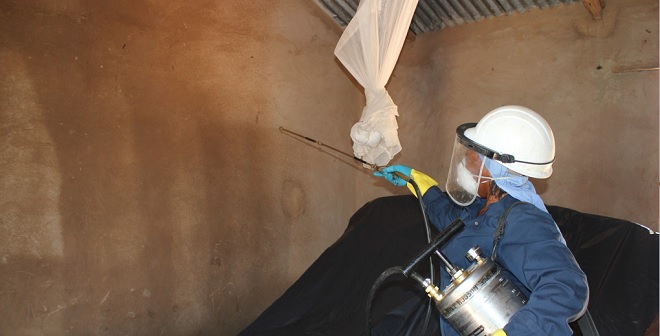
Budaka, Uganda | THE INDEPENDENT | Several households in Budaka district are opposed to the ongoing Indoor Residual Spraying-IRA program citing various concerns. Budaka district health department launched the IRS program on Monday with the aim of fighting malaria in the district. The exercise which commenced on March 1st, 2021 covering the districts of Kibuku, Pallisa, Butaleja and Butebo is expected to take 24 days.
However, some households in Budaka are opposed to the program saying IRS causes impotence in men. They also claim that the chemicals used for spraying contribute to the multiplication of bedbugs and that it is ineffective given the fact that they experienced a surge in the number of mosquitoes in their houses after the previous exercise.
Apparently, the team is using Fludora fusion which is in powder form. IRS kills mosquitoes when they come in contact with treated surfaces. Richard Moko, the IRS focal person in Budaka district told Uganda Radio Network that residents have decided to boycott the IRS program claiming it causes bedbugs. He said that many residents close their doors pretending to be away in the garden just to dodge their teams.
Moses Bote, a resident of Nakibulu village in Budaka town council says they are opposed to the exercise because one of the sprayers died during the last exercise. The deceased was identified as 23-year-old Kenneth Ndoboli, a resident of Nulugondo village in Tademeri parish in Lyama sub county in Budaka district and was contracted by Vector Link to carry out IRS.
Bote says that since that incident, residents have been skeptical about the spraying which has made many of them to boycott the exercise.
Shakira Baseme, a resident of Kibaale village in Bwase Parish says that people are willing to spray their houses but the type of insecticide they used last year triggered fear among residents.
Francis Ouma, another resident attributes the resistance by the locals to the absence of sensitization by the local leaders about the program.
During the launch of the program on Monday, Budaka Resident District Commissioner Tom Chesol vowed to take stern action against residents and leaders who will dare try to sabotage the program. “We shall go down to the ground to oversee the process. I am aware that there are some members of the community and leaders who are jeopardizing this activity by locking their houses, my security team is equipped and ready to arrest anybody and arraign them before courts of law,” Chesol said.
Dr. Erisa Mulwani, the Budaka District Health Officer says malaria contributed 90 % to all cases of patient attendance in the Outpatient Departments within the district. Children and pregnant mothers were the most affected. Malaria prevalence in the district has increased from 15% to 45% in the past three months with Kamonkoli, Iki Iki, Kameruka, Kachomo and Mugit sub counties being the worst hit.
Mulwani said before the IRS intervention in 2014, malaria contributed to high mortality and morbidity in children less than five years of age. It also contributed to a big number of OPD attendance, admissions, blood transfusions and abortions. Arthur Wako Mboizi, the Budaka County MP has asked the district leadership to start sensitizing the community on hygiene before embarking on spraying.
The IRS program is funded by USAID under the Presidential Malaria Initiative and implemented by district local governments.
*****
URN
 The Independent Uganda: You get the Truth we Pay the Price
The Independent Uganda: You get the Truth we Pay the Price



